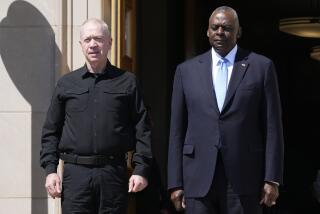Bush Warns Iraq, but Allies Hedge : War aftermath: Baghdad is making an ‘enormous mistake’ if it doesn’t reveal all nuclear facilities, he says. But he sets no new deadline for compliance.
- Share via
WASHINGTON — President Bush, warning that the use of force is still a “viable option,” said Sunday that Iraq will be making an “enormous mistake” if it does not disclose all of its nuclear capabilities to U.N. inspectors.
But confirming that some U.S. allies are reluctant to start the Persian Gulf War again, Bush said he has set no new deadline for Iraq to comply with a U.N. cease-fire requirement that it disclose all information about its nuclear, chemical and biological weapons programs.
“We are talking to our other friends and allies about this,” Bush told reporters at Andrews Air Force Base, Md., where he spent Sunday playing golf. “I don’t really have a deadline in mind.”
A U.N. deadline for Iraq to disclose its nuclear capabilities passed Thursday, and Administration officials have said that launching air strikes against suspected nuclear and chemical weapons sites is an option open to the United States.
However, more strong signals emerged from several key allies Sunday that military action in the near future to enforce the demand would not be acceptable to them.
Egypt is understood to have already conveyed its strong reservations about new air strikes to Washington. And in Turkey on Sunday, Prime Minister Mesut Yilmaz told reporters that his government would not allow allied aircraft to use Turkish bases for strikes against Iraqi facilities as it did during the Gulf War. “I rule it out,” he said.
In a sign of further discord, a Soviet Foreign Ministry spokesman also warned Sunday that the use of force against Iraq might have “negative consequences . . . larger than maybe the intended goal of those actions.”
If “we resort to military force, I think it would not be met with equally unanimous approval by the international community, as was the case during the Iraq aggression against Kuwait,” Foreign Ministry spokesman Vitaly I. Churkin said in an interview on CNN’s “Newsmaker Sunday.”
One major reason for this reservation is the fear that another attack on Iraq now would jeopardize the delicate efforts under way to convene a Middle East peace conference just when those efforts appear to be on the verge of succeeding, U.S. and Arab officials confirmed. “It’s a question of maybe taking a little bit more time to see how things develop,” one Bush Administration source said. “A lot of people just don’t want to see these things undone.”
“There are mixed degrees of enthusiasm, or lack of enthusiasm,” among the allies about the use of force, Bush acknowledged. But overriding these “divisions,” he added, is a “unanimity that this lying and secreting of material must stop.”
Bush said that “everybody would prefer not to use force” but that Iraqi President Saddam Hussein’s continued refusal to give U.N. inspection teams access to key facilities might leave the allies with no other choice. “That option (using force) remains very viable,” the President said.
A new team of U.N. inspectors arrived in Iraq over the weekend to inspect the site of a secret uranium enrichment program at Tuwaitha, southeast of Baghdad. The team was to visit other sites today, and Bush said that he hopes Iraq will comply with all of the inspectors’ requests.
But he added that the United States has “very good evidence” that “Saddam continues to hide and conceal” key aspects of Iraq’s nuclear capabilities.
“Regrettably, there is a strong feeling that he is not coming totally clean,” Bush said. “And therein he’s making an enormous mistake.”
Bush spoke to reporters on the eve of his departure for Moscow to sign a strategic arms treaty at what he described as “the first post-Cold War summit” with Soviet President Mikhail S. Gorbachev. The two leaders also hope to announce an Arab-Israeli agreement to attend a Middle East peace conference sponsored jointly by the United States and the Soviet Union.
The ascendence, even if only temporarily, of a moderate Arab coalition brought together by the Persian Gulf War helped pave the way for the peace conference after years of diplomatic frustration. But even solidly pro-American countries such as Egypt were not able to side with the United States against Iraq without some cost in the form of popular dissent at home.
To attack Iraq again, without a provocation as compelling as its invasion of Kuwait, would foment even more discontent and make it harder for countries such as Jordan and Syria to join in a U.S.-sponsored peace settlement, Arab diplomats said.
“We don’t see it as useful to strike Iraq again,” Syrian President Hafez Assad was quoted as saying in an interview in the Washington Post on Sunday. “The harm in that case will not affect only the person of the ruler. It will touch the Iraqi people. . . . We do not want new conditions to be created to add to the suffering of the Iraqi people.”
More to Read
Sign up for Essential California
The most important California stories and recommendations in your inbox every morning.
You may occasionally receive promotional content from the Los Angeles Times.










